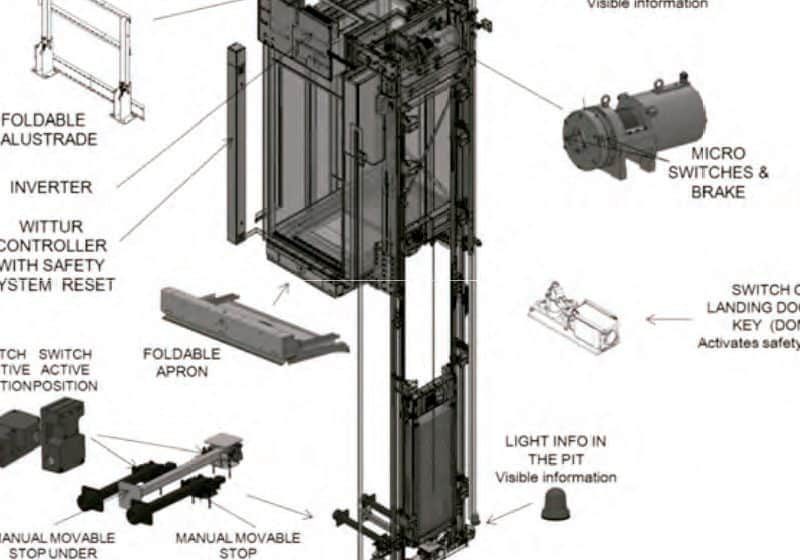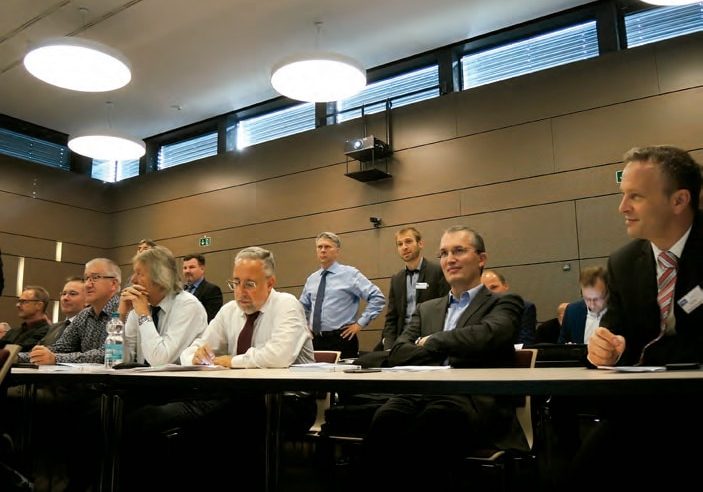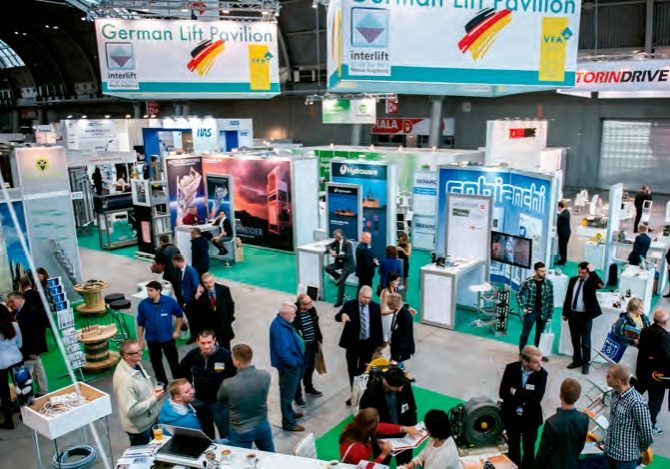Plastics Are Fantastic
Jan 1, 2017

R&D-driven technology has fueled faigle’s rise to become the world’s leading escalator-roller supplier.
Headquartered in Hard, Austria, faigle is a plastics specialist that has developed hydrolysis-resistant, precision, durable rollers used in more than half of the escalators in the world. With 350 employees worldwide, faigle produces a broad range of components for not only escalators, but also conveyor systems, railways, cranes and other systems.
faigle was founded more than 60 years ago by Heinz Faigle, who realized the potential of thermoplastics, which was not widely used at the time. In his search for innovations in technical plastics, Faigle laid the foundation for the success of the company, which has been making a significant contribution to the development of plastics and plastic technologies ever since.
Because the development potential for technical plastics is enormous, faigle still makes it its business to research new opportunities. Many escalator components are made from PAS® PU-H, an elastomer and theromoplastic polyurethane available in various hardnesses.
faigle also makes step bushings and edges, and is particularly proud of the R&D that went into its handrail rollers. Typically much wider than chain and step rollers, handrail rollers are made from either hard polyamide or soft polyurethane, depending on the application.
faigle manufactures original parts for all the major escalator OEMs, not only rollers, but also step bushings and edges. Parts are made from raw materials from European producers and manufactured in accordance with strict specifications. Examples of applications for products made with PU-H include hanging straps, which faigle states are “high gloss, pleasant to the touch, fireproof, tear resistant and available in a variety of colors.”
Because it has a much higher abrasion resistance than rubber, PU-H is ideal for harsh, continuous-duty applications, faigle observes. It also has:
- Tear propagation resistance, which prevents belt damage that may be caused by sharp edges or chips, later resulting in large cracks or tears.
- Absorption capability against impacts and dynamic loads, which therefore dampens noise and vibrations. Its resilience prevents permanent deformation and roller flattening.
- Resistance to hydrolysis, as opposed to conventional polyurethane, which becomes severely damaged by the ingress of water. Over 20 years, faigle found that use of PAS PU-H in rollers more than doubles roller service life in damp conditions, compared with conventional materials.
On average, an escalator track roller is in operation for approximately 70,000 hr. during its lifetime, often around the clock, and can cover up to 126,000 km. Continuous operation, high loads and climatic factors represent enormous challenges for many components. “Anywhere large groups of people convene, escalators must convey crowds quickly and smoothly to their destination. If the flow of people stops at any point, dangerous situations can arise,” faigle points out.
With this in mind, the reliable operation of escalators must be guaranteed at all times. Components manufactured by faigle fulfill this essential requirement, the company states, continuing:
“For each individual part, the same rule always applies: The quality of the final product begins when the materials are first selected. Each component is manufactured in house at the company’s own factories and consists exclusively of first-class raw materials.”
Functions of Rollers
Rollers with different functions are responsible for keeping an escalator in operation. Rollers convey loads and guide other components, reducing friction within the system. “Each type of roller is specially designed for each application and varies in terms of design and material composition, as well as in width, hardness and diameter,” explains Ines Bisesti, director of Sales and Business Development. For example, step rollers are mounted at the front edge of aluminum stairs and will bear most of the weight of the steps and passengers. Chain rollers are mounted in or on the chains that drive the escalator. A range of different rollers are used for guiding, driving and tensioning the handrail.
All of faigle’s original components are available to order for many years after their introduction. This also applies to other faigle escalator components, including slides for lateral guidance of steps, plus bushings for connecting the step to the drive chain or step edges.
Protection against Moisture: Hydrolysis-Resistant Polyurethane
Escalators are used in a wide range of different climates around the world. High humidity levels or completely outdoor sites present great challenges for rollers. “In both cases, there is a risk that the polyurethane on the running tire could be damaged by humidity or rainwater,” Bisesti observes. “When this happens, the material becomes brittle and cracks.”
faigle pinpointed hydrolysis (decomposition of the polymer material by water molecules) as a problem, and, in response, developed a hydrolysis-resistant type of polyurethane. Bisesti states:
“In addition to the hydrolysis resistance of the polyurethane, the ball bearings can be protected against the penetration of water, particularly on escalators exposed to the elements. To this end, faigle has developed grease-filled labyrinth seals as an additional means of protecting the ball bearings against moisture. These seals can be used for virtually all faigle rollers.”
Test Stands: Trust Is Good; Control Is Better
In addition to the material used, another key characteristic of rollers designed for escalators is the dimensional accuracy of the individual components. This is because deviations in diameter can cause uneven loading of the rollers, as well as vibration, noise and excessive loading on the ball bearing.
To guarantee a consistently high level of dimensional accuracy for its rollers, faigle put a lot of work into developing testing technologies and specifications for escalators over several decades. “faigle has launched numerous developments that are considered state of the art in the industry,” Bisesti says. “Today, the company has access to a comprehensive and technologically advanced range of roller test stands for escalator rollers.”
faigle regularly tests roller quality on internally developed stands. The tests are standardized and, in some cases, fully automated, thus ensuring efficient reliability.
All measured values are recorded and archived electronically. faigle checks various roller properties, including concentricity, oil resistance, hydrolysis and static load-bearing capacity. Short- and long-term running tests are also used to gather information about the suitability of the rollers for their intended purpose and operational safety. A lifetime test simulates the complete service life of the roller and thus represents an essential release criterion for series production.
A Uniform Quality Standard
At faigle, quality begins with the raw material but does not end until long after the finished roller has been produced. “A continuous inspection process is applied not only to our products, but to all of our development and production processes,” according to Bisesti. In addition, engineers and technicians are always working on developing the materials used and optimizing roller design. faigle continues to place the same emphasis on R&D today as it did 60 years ago. New materials are always being tested, new designs evaluated, manufacturing technologies developed and existing materials improved and optimized. faigle believes technology is the key to its success, whether it is used for R&D, efficient processes and manufacturing procedures, product features or application technologies.
All faigle factories are committed to this philosophy — from the main subsidiary in Hard to the factory in Suzhou, China. The company states:
“All factories within the faigle Group manufacture products in accordance with uniform specifications based on the same high standards. Austrian machines are even used in Suzhou. Experienced managers trained at the company headquarters monitor all production steps using a comprehensive computerized system.”
The company, which today is owned by Heinz Faigle’s son, Wolfgang Faigle, believes its all-round expertise is a particular strength. Customers can obtain R&D, manufacturing, products and technology. These days, such a broad range of specialties is no longer a given in the industry, yet it is an advantage that managers emphasize all the clearer in their dealings with customers. According to the company:
“We cannot demand trust from the customer. We must earn it. Quality is the service that we offer to the customer, and their trust is our future.”
Get more of Elevator World. Sign up for our free e-newsletter.









